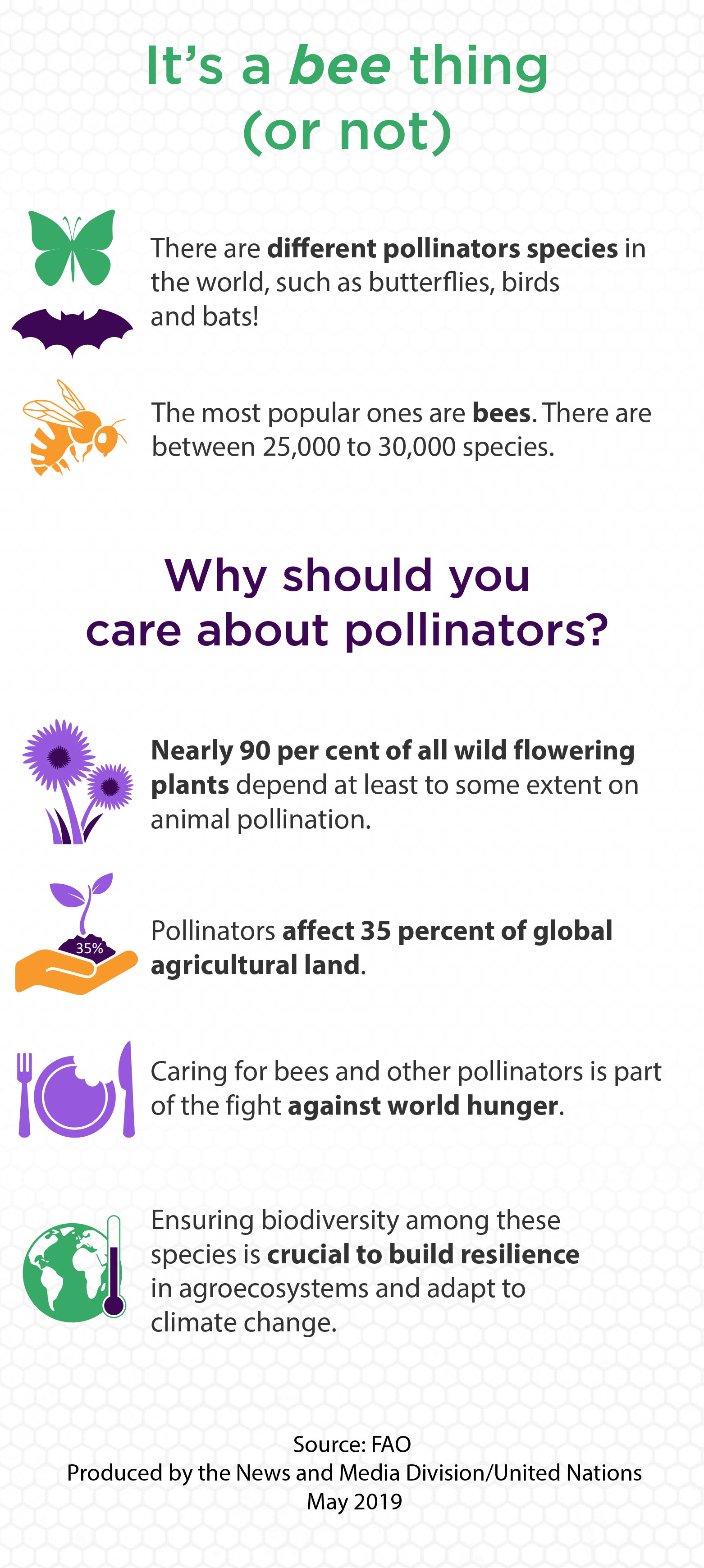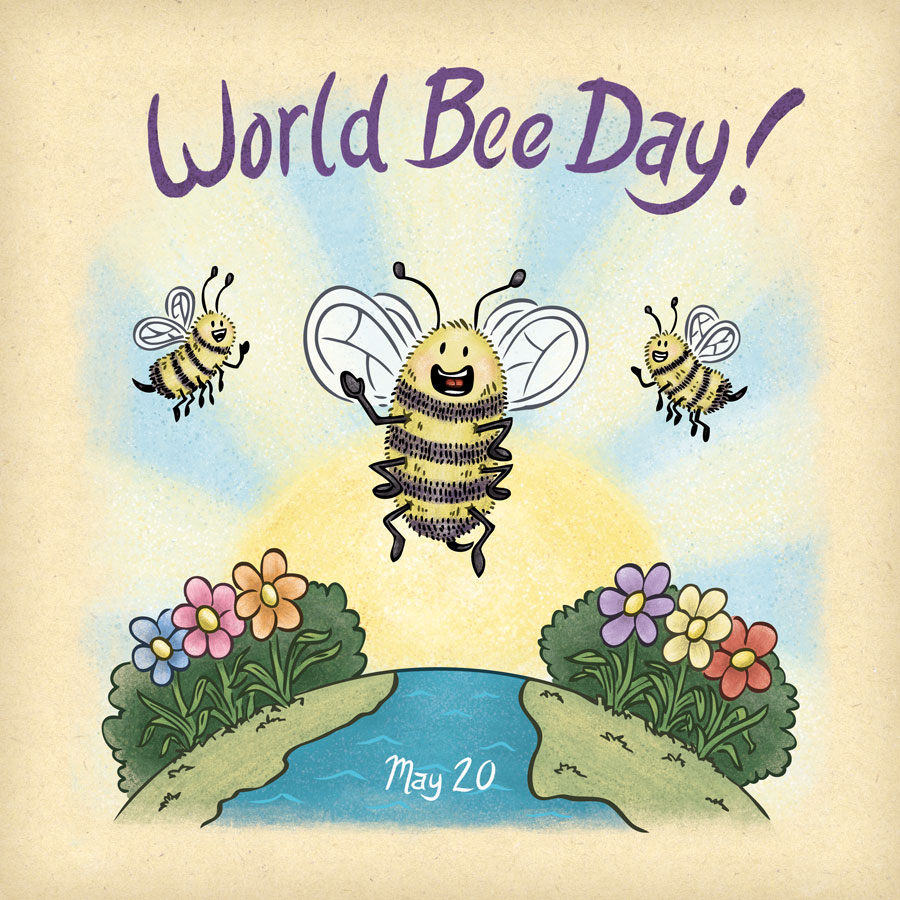Celebrating World Bee Day 2021
COVID-19 and World Bee Day
The main purpose of World Bee Day events is to spread awareness of the significance of bees and other pollinators for our survival. Simply proclaiming World Bee Day does not do much for bees and other pollinators; the main work of safeguarding their existence still needs to be undertaken. World Bee Day is an excellent opportunity to put bees at the centre of the national conversation for a day and encourage actions that create more bee-friendly landscapes.
Beekeepers and nature conservationists are united in encouraging improved conditions for bees to build pollination security and to safeguard our food security.
We all depend on the survival of bees
Bees and other pollinators, such as butterflies, bats and hummingbirds, are increasingly under threat from human activities.
Pollination is, however, a fundamental process for the survival of our ecosystems. Nearly 90% of the world’s wild flowering plant species depend, entirely, or at least in part, on animal pollination, along with more than 75% of the world’s food crops and 35% of global agricultural land. Not only do pollinators contribute directly to food security, but they are key to conserving biodiversity.
To raise awareness of the importance of pollinators, the threats they face and their contribution to sustainable development, the UN designated 20 May as World Bee Day.
The goal is to strengthen measures aimed at protecting bees and other pollinators, which would significantly contribute to solving problems related to the global food supply and eliminate hunger in developing countries.
We all depend on pollinators and it is, therefore, crucial to monitor their decline and halt the loss of biodiversity.

Bee engaged : build Back Better for Bees
The fourth observance of World Bee Day will be celebrated - in the midst of a still ongoing pandemic - with a virtual event organized by the FAO on 20 May 2021 under the theme “Bee engaged – Build Back Better for Bees”.
The event will call for global cooperation and solidarity to counter the threats posed by the COVID-19 pandemic to food security and agricultural livelihoods alongside prioritizing environmental regeneration and pollinator protection. It will be an occasion to raise awareness of how everyone can make a difference to support, restore and enhance the role of pollinators.
We need to act now
Bees are under threat. Present species extinction rates are 100 to 1,000 times higher than normal due to human impacts. Close to 35 percent of invertebrate pollinators, particularly bees and butterflies, and about 17 percent of vertebrate pollinators, such as bats, face extinction globally.
If this trend continues, nutritious crops, such as fruits, nuts and many vegetable crops will be substituted increasingly by staple crops like rice, corn and potatoes, eventually resulting in an imbalanced diet.
Intensive farming practices, land-use change, mono-cropping, pesticides and higher temperatures associated with climate change all pose problems for bee populations and, by extension, the quality of food we grow.
Recognizing the dimensions of the pollination crisis and its links to biodiversity and human livelihoods, the Convention on Biological Diversity has made the conservation and sustainable use of pollinators a priority. In 2000, the International Pollinator Initiative (IPI) was established (COP decision V/5, section II) at the Fifth Conference of Parties (COP V) as a cross-cutting initiative to promote the sustainable use of pollinators in agriculture and related ecosystems. Its main goals are monitoring pollinators decline, addressing the lack of taxonomic information on pollinators, assessing the economic value of pollination and the economic impact of the decline of pollination services and protect pollinator diversity.
Along with coordinating the International Pollinator Initiative (IPI), the FAO also provides technical assistance to countries on issues ranging from queen breeding to artificial insemination to sustainable solutions for honey production and export marketing.
How can we do more?
Individually by:
- planting a diverse set of native plants, which flower at different times of the year;
- buying raw honey from local farmers;
- buying products from sustainable agricultural practices;
- avoiding pesticides, fungicides or herbicides in our gardens;
- protecting wild bee colonies when possible;
- sponsoring a hive;
- making a bee water fountain by leaving a water bowl outside;
- helping sustaining forest ecosystems;
- raising awareness around us by sharing this information within our communities and networks; The decline of bees affects us all!
As beekeepers, or farmers by:
- reducing, or changing the usage of pesticides;
- diversifying crops as much as possible, and/or planting attractive crops around the field;
- creating hedgerows.
As governments and decision-makers by:
- strengthening the participation of local communities in decision-making, in particular that of indigenous people, who know and respect ecosystems and biodiversity;
- enforcing strategic measures, including monetary incentives to help change;
- increasing collaboration between national and international organizations, organizations and academic and research networks to monitor and evaluate pollination services.
Why do we need pollinators?

Pollinators allow many plants, including many food crops, to reproduce. Indeed, the food that we eat, such as fruits and vegetables, directly relies on pollinators. A world without pollinators would equal a world without food diversity – no blueberries, coffee, chocolate, cucumbers and so much more. They also serve as sentinels for emergent environmental risks, signaling the health of local ecosystems.
Pollination, a pillar of our ecosystems
Pollinators not only help ensure the abundance of fruits, nuts, and seeds, but also their variety and quality, which is crucial for human nutrition. Beyond food, pollinators also contribute directly to medicines, biofuels, fibers like cotton and linen, and construction materials.
The vast majority of flowering plant species only produce seeds if animal pollinators move pollen from the anthers to the stigmas of their flowers. Without this service, many interconnected species and processes functioning within the ecosystem would collapse.
Disappearing pollinators can mean losing some of the nutritious food we need for a healthy diet. The decline of pollinators could have disastrous effects for our future of food. Their absence would jeopardize the three-quarters of the world’s crops that depend at least in part on pollination, including apples, avocadoes, pears and pumpkins. And enhancing pollination isn’t just about mitigating disaster – with improved management, pollination has the potential to increase agricultural yields and quality. Pollinators also play a crucial role in maintaining and enhancing biodiversity thus improving the resilience of plants to climate change and other environmental threats.
Pollination is therefore a keystone process, in both human managed and natural terrestrial ecosystems. It is critical for food production and human livelihoods and directly links wild ecosystems with agricultural production systems
The scientific method of rearing honeybees is known as Apiculture. It deals with the caring and management of honey bees to produce wax and honey. In this procedure, bees are commercially bred in apiaries. Apiary is a region where several beehives are placed. These apiaries can be set up in areas where there are enough bee pastures, typically in areas having flowering plants.
Bees, the ambassadors of pollinators
Most of the 25,000 to 30,000 species of bees (Hymenoptera: Apidae) are effective pollinators, and together with moths, flies, wasps, beetles, and butterflies, they make up the majority of pollinating species. But the diversity of pollinators and pollination systems is striking.
Indeed, there are also vertebrate pollinators, including bats, non-flying mammals (such as several species of monkey, rodents, lemur, tree squirrels, olingo, and kinkajou) and birds (hummingbirds, sunbirds, honeycreepers and some parrot species).
Current understanding of the pollination process shows that, while specific relationships exist between plants and their pollinators, healthy pollination services are best ensured by an abundance and diversity of pollinators.
No pollinators, no SDGs!
The diversity of pollinators have a direct and positive impact on crop yields. Bees and other pollinating insects are, in fact, improving the food production of 2 billion small farmers worldwide, helping to ensure food security for the world's population. Honey hunting of wild bee colonies also remains an important part of the livelihoods of forest-dependent peoples in many developing countries. Conversely, the decline of these species has many consequences on our ecosystems and on the quality and quantities of food crops, with a direct consequence of an imbalance in diets and a depletion of natural resources, as well as an impoverishment of populations. The health and even the lives of billions of people will be affected and, therefore, many sustainable development goals (SDGs), such as the one aiming at ending world hunger and the one aiming at preserving and restoring terrestrial ecosystems, will no longer be attainable.
Adapting to changing climates
A diverse assemblage of pollinators, with different traits and responses to ambient conditions, is also one of the best ways to minimize risks due to climate change. Their diversity ensures that there are effective pollinators not just for current conditions, but for future conditions, as well. As a result of biodiversity, resilience can therefore be built in agro-ecosystems.
Read More👇


Save bee
ReplyDeleteHoney bee is a main part of our envoirment
ReplyDelete